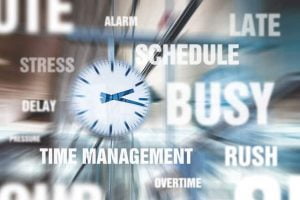There are numerous project management qualifications available from an introductory level right up to degree or chartered level. They cover a variety of methodologies in order to help you manage projects more successfully and more consistently. From the APM Project Foundation Qualification to the advanced APM Registered Project Professional (APM RPP) accreditation, all PM courses involve a level of intensity. They require dedicated preparation and study in order to gain a secure understanding of how to be effective as a project manager. But what about personal effectiveness in a professional situation?
Just as every project involves planning, execution and evaluation, it seems fitting that project managers should take the time to reflect on their personal effectiveness and how to combat stress in those pressured moments.
How do you plan, execute and evaluate your effectiveness as a project manager?
This guide aims to outline some tips that will enable you to manage yourself, and your projects, with as much ease and enjoyment as possible.
The appeal is also the problem
If you’re involved in project management you will understand the initial appeal it brings: the adrenaline that comes from such an unpredictable role, the success of delivering a project on time and within budget, and working within a complex task-management system. You’ll also have an appreciation for the level of interdependence within project management: all these things contribute to job satisfaction but also trigger stressful moments and frustrations that can take the enjoyment out of project management.
Stress doesn’t just affect your personal motivation and job satisfaction; it can affect several areas of your role. Poor task performance, interpersonal performance and organisational performance are all byproducts of working hard rather than smart and can hinder you from working efficiently.
It’s easy to understand why stress is so common amongst this newly recognised profession. With an increasing need for effective PM in this fast-paced business world, organisations must be able to react to new demands and adapt to higher expectations and larger scale projects.
Within PM roles, you are required to define the business case, establish the scope of the project, plan delivery, identify and manage risk, monitor and track progress. To manage the numerous elements of your role, you need to display certain personal and professional characteristics that will help you with managing stress when the pressure hits.
Recognising the issues and symptoms
There’s a reason the phrase ‘failure to plan is planning to fail’ is widely used. Planning doesn’t just involve scoping your own role: it involves interdependencies. One of the most stressful situations is when you have not managed a team member’s backlog and suddenly you find yourself having to explain why progress hasn’t happened. You must have an awareness of who’s relying on whom. Knowing this is a great form of collaboration as it encourages independence among teams who are working towards a common goal. As a project manager, you should encourage independence. As stressful as it is to lead the project, there is a team around you for a reason.
This kind of awareness is just as important as recognising that you are over-stressed in the first place. There’s a fine line between optimal performance and burnout. Working under a certain level of stress results in focused, energised work but when the scales are imbalanced, this is when (personal and professional) exhaustion and burnout can occur. The beginning of managing stress involves looking honestly at our workload, work ethic and our coping mechanisms. Of course, there is no one-size-fits-all technique but there are things you can try.
Communication
To begin with, you need to display excellent communication skills as well as excellent project management skills. As you are the main point of contact during the project, you need to understand the roles of everyone involved and communicate differently so that they understand the progress.
There is no use churning out dry, impersonal messages just to fulfil your to-do list; you need to make sure that each person – whether stakeholders, clients or customers – receive meaningful, concise communication that highlights the most important information. If you communicate clearly, you will manage the expectations of your colleagues and this will eliminate unnecessary stress.
Organisation
As this is a fundamental part of your role, it’s pretty obvious that you need to be well organised. However, planning can often feel like a really long and arduous process and some PMs end up trying to ‘wing it’. Good organisation involves using a task management tool that works for you. Even if your company use a particular framework, there’s no reason why you can’t use a different system to manage your personal workload and keep yourself focused. Once you’ve found the setup that works for you, it’ll become second nature to be well-organised and you will benefit from the consequent reduction in stress levels.
Time management
Regardless of which project management approach you use you will need to manage schedules of work. Some deadlines are fixed, and some require more flexibility but it’s essential that you are able to manage your own time before overseeing everyone else’s. It’s easy to neglect your own schedule when you’re busy managing others but don’t forget to factor in time to manage! You will spend a lot more time checking in with your colleagues than you may expect so make sure you plan for this. Your team are more likely to suffer if you take on the martyr role than if you are realistic about your own workload.
Interpersonal skills
Every successful project manager needs to consider relationships as one of their most valuable assets. A wise person once said that ‘everything rises and falls on leadership’ and although this may seem like a lot of pressure, just know that excellent interpersonal skills can actually help relieve stress. You need to be able to work well with your team and be able to motivate and challenge when necessary.
One of the key ways to build trust in your team is to keep closing the gap in the amount of time between promise and delivery. In other words, if you tell someone you’re going to complete a task, the quicker you are able to turn it around the better. This doesn’t mean overpromising because this has the opposite effect. Be realistic about when you can complete tasks and make sure you follow through. Knowing that you’re building trust in your team will give you peace of mind and help you operate most effectively.
Understanding different personality types can be quite liberating as a project manager. Depending on which category you identify with (try using the Myers-Briggs Type Indicator) you will have different methods of making decisions. Some prefer to make decisions using a logical, ‘thinking’ approach whereas others prefer a ‘feelings’ based approach, defined by a more subjective manner that considers how decisions impact factors like morale and motivation. If you feel that your stress is impacted by interpersonal problems, try conducting a Myers-Briggs test and identify how you and your team operate. This understanding may be the simplest, most effective way to manage the stress of leading a diverse team.
Problem-solving
Of course, every project comes across problems and sometimes they can seem insurmountable. To be able to stay calm under pressure and manage your workload, you need to have a good way of dealing with problems. There are many problem-solving formulas you can use to help you perform well – most of them involve identifying the problem, structuring the problem then developing and implementing solutions but this is often easier said than done.
Although the actions you take are important, the ability to reflect once you’ve solved the problem is often overlooked yet it can be more important in helping you become a better project manager. Many PM frameworks involve retrospective meetings where you can reflect on the success of the project at certain points but, as said before, remember to take time to personally reflect on your own success. Did you communicate properly? Did you organise your own time, your team and problem-solve efficiently? It may be tough to face the facts sometimes but being honest with yourself is really important.
There are many schools of thought on stress management and applying some theory is a valid tool. Being aware of the psychological factors that affect your productivity is really important. Positive psychology involves addressing the problem situation and becoming more able to use your problem-solving abilities. Seeing problems as opportunities for growth sounds twee but helps to develop more positive behaviours amongst yourself and your team. Just as there’s a level of flexibility required in project management, you must view the team as a fluid group that has the ability to change attitudes and behaviours in order to work more harmoniously together.
Similarly, other cognitive approaches suggest that our success can be defined by the way we think. It is a natural reaction to respond to situations by labelling the issue and feeling like it can never change, but this can trigger levels of anxiety that become hard to control. The theory of ‘neutral cognition’ asks us to think realistically but keep an open mind to positive change. You can also identify factors of the situation that you do and don’t have control over. This will allow you, as the PM, to take control of the situation and work on the factors that can be controlled.
Operating at your best involves balancing a certain level of stress but avoiding burnout. Participation in ‘flow activities’ is a way of reducing the stress that psychologists have investigated. Flow activities are tasks that we get swept up in, losing track of time and becoming less self-conscious. The aim is to complete flow activities feeling much less stressed than before. These activities vary from person to person: whether it’s playing music, gaming, running or walking.
Why not involve others in your flow activities, too? It is scientifically proven that taking time out with others, laughing and enjoying life releases endorphins and helps you to connect better. Incremental changes to your routine will help you to manage your workload so start researching some activities you can do to break up the monotony of your working week. Avoid the negative thoughts that will make you less productive; sometimes you need to take time out in order to work more efficiently in the long run.
Practical tips
If all else fails, there are some very practical things you can do to minimise stress. Firstly, make sure you get enough sleep. The science behind good sleep is actually quite scary. Stare at your screen for too long and you’ll be doing yourself much more damage than you think. Be kind to yourself and get some rest.
Secondly, make sure you get some fresh air and thinking space every day. It has been suggested that your brain needs a minimum of 16 minutes to properly detox with no distractions. Whether you like to meditate or just switch off from the world, make sure that you give yourself the opportunity to ‘be.’
If you prefer to be around others, then you could consider pet therapy. Many well-known companies have pet-friendly policies as they know the impact it can have on stress. If this is not an option, consider getting yourself a pet or if this is too much of a commitment, there are many apps you can download which allow you to connect with pet owners who may need a little help. Perhaps walking a neighbour’s dog once a week will be your new solace? It could be worth a try.
Or you could consider setting up space in the office to escape the daily grind. Whether you’d prefer games consoles or playing the piano there are many ways to fill a space with fun alternatives to the office kitchen. Walk away from the biscuit tin and try something that’ll give your brain the proper break it needs.
Recognising and managing stress is essential when you’re in a job as challenging yet stressful as project management.


